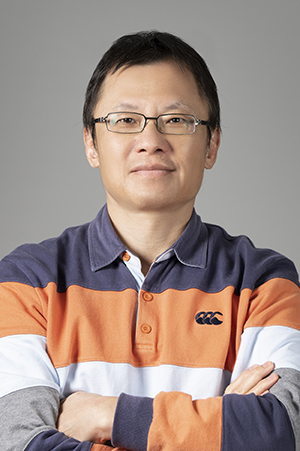
 中央研究院 生物化學研究所
中央研究院 生物化學研究所

人類紅血球抗原的分子遺傳學。
我們研究室的興趣在於人類紅血球表面抗原的分子(基因)機制,以及這些抗原在人或族群間呈現的歧異性的分子遺傳學;我們研究的大多是醣抗原和其生合成相關的基因。近幾年我們研究的專題有ABO血型抗原基因與ABO稀有血型、Secretor a-1,2-fucosyltransferase基因和Lewis抗原表現型的關係、以及I b-1,6-N-acetylglucosaminyltransferase基因和I抗原表現及先天性白內障生成的分子遺傳學機制。除了基因型別與醣抗原表現型的關聯,我們也研究在細胞分化過程中,醣抗原表現的輪廓,以及相關醣抗原基因表現的調控機制。目前我們研究室專注於紅血球表面P1(Gala1-4GalNAcb1-3Gal)及Pk(Gala1-4Galb1-4Glc)抗原表現的分子遺傳機制,以及細胞分化過程中I醣抗原表現的變化和I基因表現的調控機制。
Molecular genetics of the blood group I system and the regulation of I antigen expression during erythropoiesis and granulopoiesis.
Yu LC, Lin M
Current opinion in hematology (2011)
Phosphorylation status of transcription factor C/EBPα determines cell surface poly-LacNAc branching (I antigen) formation in erythropoiesis and granulopoiesis.
Twu YH, Hsieh CY, Lin M, Tzeng CH, Sun CF, Yu LC
Blood (2010)
Expression of the human Sd(a) beta-1,4-N-acetylgalactosaminyltransferase II gene is dependent on the promoter methylation status.
H. R. Wang, C. Y. Hsieh, Y. C. Twu and L. C. Yu
Glycobiology (2008)
I branching formation in erythroid differentiation is regulated by transcription factor C/EBP{alpha}.
Y. C. Twu, C. P. Chen, C. Y. Hsieh, C. H. Tzeng, C. F. Sun, S. H. Wang, M. S. Chang and L. C. Yu
Blood (2007)
A novel IGnT allele responsible for the adult i phenotype.
Lin M, Hou MJ, Yu LC
Transfusion (2006)
Expression of the histo-blood group B gene predominates in AB-genotype cells.
Twu YC, Hsieh CY, Yu LC
Transfusion (2006)
The Molecular Genetics of the Human I Locus and Molecular Background Explain the Partial Association of the Adult i Phenotype with Congenital Cataracts.
L. C. Yu, Y. C. Twu, M. L. Chou, M. E. Reid, A. R. Gray, J. M. Moulds, C. Y. Chang and M. Lin
Blood (2003)
Molecular genetic analysis for the B(3) allele.
L. C. Yu, Y. C. Twu, M. L. Chou, C. Y. Chang, C. Y. Wu and M. Lin
Blood (2002)
Molecular Basis of the Adult i Phenotype and the Gene Responsible for the Expression of Human Blood Group I Antigen.
L. C. Yu, Y. C. Twu, C. Y. Chang and M. Lin
Blood (2001)
Molecular Basis of the Kell-null Phenotype: A Mutation at the Splice Site of Human KEL Gene Abolishes the Expression of Kell Blood Group Antigens.
L. C. Yu, Y. C. Twu, C. Y. Chang and M. Lin
J Biol Chem (2001)